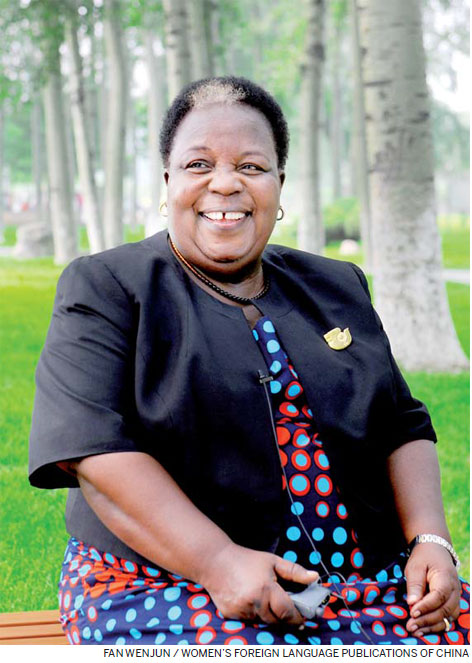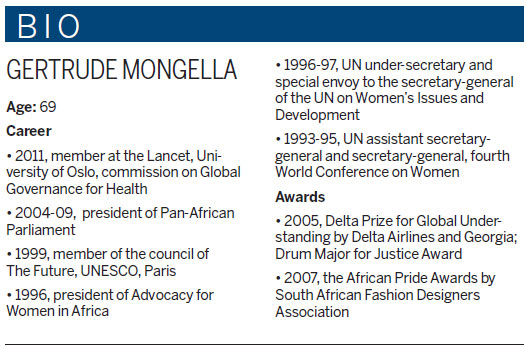Women's issues veteran still fighting

As ties between Africa and China grow, women should not be left out, says a prominent Tanzanian
China and Africa should take women into account when planning economic and social development and international collaboration programs, says Gertrude Mongella of Tanzania, secretary-general of the Fourth World Conference on Women.
Mongella, who at 69 is a prominent figure in women's issues in her country and internationally, says that China is playing a key role in Africa's development, operating many big programs in areas such as infrastructure, education and tourism. It is important to make sure these programs also benefit women from both sides, she says.


"Development, in China in particular, is like a bullet train, and without China's development, women will be left behind," she says. "There will be a bullet train that moves from China to Africa and from Africa to China. Let's all be on that train. We cannot just sit and watch men travel from China to Africa or from Africa to China. We have to be on the bullet train."
When China sets up scholarships in Africa, for example, it should consider how the scholarships could help African women obtain access to education, she says. In the tourism industry, it should look at whether women could sell more tourist souvenirs or get jobs in tourism-related industries.
"China is very active in Africa's development now, which is a great opportunity for women in Africa, as they could play a more important role in the process," Mongella says. "We hope women in Tanzania benefit from such industry, and more industries to come."
For Africa, China is a huge market. A huge amount of business could be generated for both sides if every Chinese person drank a cup of Tanzania's famous coffee every day.
"I want to see more women participate in international trade and programs and agreements signed by governments," she says, adding that she would also like to see more women working in research and development institutes.
Mongella was in Beijing recently at the invitation of the All-China Women's Federation to learn about Chinese women's development. This year also marks the 20th anniversary of both China's state policy of gender equality and the Fourth World Conference on Women in 1995, held in Beijing.

Mongella says the conference was the biggest and most effective ever held under United Nations auspices and led to several breakthroughs. The conference first identified 12 fields in which to promote progress and improve women's development, prompting many countries to show concern for women's causes and change policies and laws. Meanwhile, many people's thinking has shifted.
"With the Beijing conference, we were able to break the silence on so many issues," she says, citing violence against women as an example. "Everywhere they speak of violence against women as evil, the conference criticized a lot of bad treatment of women," she says.
The conference connected women from all over the world, and made them start sharing thoughts and actions about women's issues, she says. There has also been great progress in the past 20 years: Girls' education has increased, more women are receiving higher education, and their awareness of women's rights and women's role in society is also improving.
Government commitments, such as Tanzania's promise to improve women's health, education and economic situation, have increased. Some countries have excelled, such as Rwanda, where there are women leaders in many important jobs, such as bank presidents and sheriffs.
Mongella says she was one of the very few women of her generation who attended college. She also became the first president of the Pan-African Parliament in 2004. She was a longtime member of Tanzania's parliament and a government minister for most of the 1980s. She has served in numerous national and international organizations and has received many awards, including an honorary doctorate from Ewha Womans University in South Korea.
Mongella says that men's support is very important to her, especially that of her father and husband, who gave her confidence and also made her capable of believing in others.
"Men can support you, so I also realized in politics, don't only look for support from women, look also for the support from men, because they will include you and make you part of it.
"If you exclude yourself, they will leave you aside, and you will lose your confidence, but if you have the capacity to work and to show that you can even do better than them, then they will feel comfortable and they will respect you. People will not vote for you because you are a woman. They vote for you because you are the best," she says.
She says all women should work hard to break the glass ceiling and to play a bigger role in the world. There have been many powerful and wonderful women leaders, such as Hilary Clinton, and these leaders all have courage, diligence and confidence, Mongella says. There still are many historical barriers facing women that have not been overcome yet, so women need to work harder to remove these barriers and change women's status.
Women worldwide face many similar problems, which sometimes are not related to their countries' economic status. The percentage of women in decision-making positions remains low, whether in rich countries or poor. Sometimes, in developing countries, that percentage is higher than in developed countries, she notes. In 1995, for example, the percentage of women in Tanzania's parliament was higher than in Japan's parliament.
International cooperation could help women's careers, she says, by setting up internationally accepted standards that respect women's rights.
"I would encourage women in the world to make more effort to study, to work and to seek a better economic situation," she says.
Some of the agreements established in 1995 have met with difficulties in implementation. That often is related to larger issues, such as when security and stability are lacking. In some African countries, political instability has caused women to become refugees, he notes. When they are homeless, it is more difficult for women to care about education and other issues.
"Women need to care about changes in the international situation because, whether they like or not, we are all affected by these changes," Mongella says.
Construction of international systems is still underway, and there are more programs now taking women into account. However, when governments deal with women's issues, there are still too many complications. She says she would like to see women's issues expedited more often.
In Europe, North America and Asia, industrialization took place before the development of women issues, but Africa's industrialization and the rise of the women's agenda are happening at the same time. A key issue is how to advance women's issues while developing the economy.
"We'd better pay attention to (industrialization) and ask if it is helping the development of women if we industrialize this way, and not allow women to be spectators," Mongella says
She says she wishes that her granddaughter's generation would be able to live in a society where infrastructure is completed, and poverty is already eradicated, and she would like to encourage more of the younger generation to seize Africa's opportunities as much as they can.
chenyingqun@chinadaily.com.cn
(China Daily Africa Weekly 08/21/2015 page32)
Today's Top News
- First Senior Officials' Meeting of APEC China 2026 opens in Guangzhou
- White paper details HK's efforts to safeguard China's national security
- Japan urged to adhere to a peaceful path
- Epstein case ugly face of institutional failure
- Billions invested to integrate AI into daily life
- Xi stresses role of sci-tech innovation






























